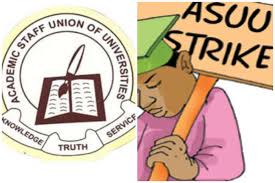ASUU Issues 14-day Ultimatum To The Nigerian Government, Threatens Nationwide Strike.

The Academic Staff Union of Universities (ASUU) has once again placed Nigeria on high alert. The union has recently issued a 14-day ultimatum to the Nigerian government, warning that failure to meet their demands will trigger a nationwide strike across all public universities. Millions of students now face the very real prospect of academic disruption, graduation delays, and uncertainty over the 2025/2026 academic calendar.
Strike action in Nigeria’s tertiary institutions has become a normal threat to public institution across the country, a familiar pattern that triggers anxiety among students, parents, and policymakers alike. But this latest ultimatum comes amid growing frustration from ASUU, whose grievances span years of unmet agreements, unpaid allowances, and deteriorating university infrastructure.
The pressing question now is: can the government negotiate in time, or are Nigerian students once again heading toward months of idle classrooms? ASUU’s list of demands is both long-standing and urgent. The union points to unpaid salaries, allowances, and arrears, including benefits that were promised but never fulfilled. Beyond compensation, ASUU is pushing for adequate funding for public universities and the revitalization of academic facilities, many of which have deteriorated to near unusable conditions.
Previous agreements between ASUU and the government, intended to end past strikes, have often failed to materialize fully, leaving educators feeling ignored and undervalued. Union leaders argue that repeated partial implementations of agreements have eroded trust, making ultimatums and threats of industrial action the only tools left to demand accountability.
Past ultimatums, such as those in 2022 and 2023, show a pattern: the government negotiates at the eleventh hour, often leading to temporary truces. But the systemic challenges remain unresolved, suggesting that without structural reform, this cycle is likely to continue.
Impact on Students and The Global Outlook.
For students, the looming strike is more than an inconvenience, it is a disruption that affects futures. Exams may be postponed, graduation timelines extended, and admissions for new students delayed. For final-year students, this could mean lost job opportunities or postponed postgraduate studies. Families bear the emotional and financial brunt. Many parents invest heavily in tuition, accommodation, and living expenses, only to face uncertainty when strikes halt academic progress. Some turn to private tutoring or online courses, attempting to salvage education during prolonged closures, but these options are often expensive and inaccessible to the majority. The ripple effects extend to local communities as well. University towns rely on students for commerce, from food vendors to transport operators. A prolonged strike can cripple local economies, leaving many businesses struggling to survive. The federal government as usual will respond cautiously, acknowledging ASUU’s concerns while emphasizing fiscal constraints.

Photo Credit: Google image
In previous negotiations, the government has attempted partial payments and phased implementations of agreements, but these measures often fall short of ASUU’s expectations. The recurring impasse suggests a deeper structural challenge: a mismatch between government capacity and union demands, compounded by a lack of long-term planning for tertiary education funding. The stakes extend far beyond university campuses. Prolonged strikes erode Nigeria’s global academic standing, making local institutions less competitive on the world stage. Students may increasingly seek education abroad, contributing to the brain drain that has long plagued Nigeria.
Economically, extended closures disrupt research, innovation, and partnerships with private and public sector organizations. The financial burden on families, universities, and local economies compounds, creating a vicious cycle of underfunded institutions and frustrated students. Recurring strikes also highlight systemic weaknesses in Nigeria’s tertiary education system, underfunding, poor infrastructure, and misalignment between government promises and implementation. If left unresolved, these issues threaten not just individual careers but the long-term development of the nation’s human capital.
Conclusion: Negotiation or Standoff?
The clock is ticking. ASUU’s 14-day ultimatum places the federal government in a delicate position: act decisively and secure peace, or risk a nationwide strike that disrupts millions of lives. The situation underscores a larger truth about Nigeria’s tertiary education system, without long-term planning, equitable funding, and genuine dialogue, this cycle of strikes will repeat, leaving students, families, and the nation in perpetual uncertainty.

Photo credit: Google image
Ultimately, resolving this impasse requires more than financial settlements. It demands trust, accountability, and structural reforms that protect educators’ rights while ensuring that students receive uninterrupted education. For now, all eyes are on Abuja: will the government rise to the challenge, or will Nigeria’s academic calendar once again pay the price of unresolved tensions?
You may also like...
Super Eagles Fury! Coach Eric Chelle Slammed Over Shocking $130K Salary Demand!
)
Super Eagles head coach Eric Chelle's demands for a $130,000 monthly salary and extensive benefits have ignited a major ...
Premier League Immortal! James Milner Shatters Appearance Record, Klopp Hails Legend!

Football icon James Milner has surpassed Gareth Barry's Premier League appearance record, making his 654th outing at age...
Starfleet Shockwave: Fans Missed Key Detail in 'Deep Space Nine' Icon's 'Starfleet Academy' Return!

Starfleet Academy's latest episode features the long-awaited return of Jake Sisko, honoring his legendary father, Captai...
Rhaenyra's Destiny: 'House of the Dragon' Hints at Shocking Game of Thrones Finale Twist!

The 'House of the Dragon' Season 3 teaser hints at a dark path for Rhaenyra, suggesting she may descend into madness. He...
Amidah Lateef Unveils Shocking Truth About Nigerian University Hostel Crisis!

Many university students are forced to live off-campus due to limited hostel spaces, facing daily commutes, financial bu...
African Development Soars: Eswatini Hails Ethiopia's Ambitious Mega Projects

The Kingdom of Eswatini has lauded Ethiopia's significant strides in large-scale development projects, particularly high...
West African Tensions Mount: Ghana Drags Togo to Arbitration Over Maritime Borders

Ghana has initiated international arbitration under UNCLOS to settle its long-standing maritime boundary dispute with To...
Indian AI Arena Ignites: Sarvam Unleashes Indus AI Chat App in Fierce Market Battle

Sarvam, an Indian AI startup, has launched its Indus chat app, powered by its 105-billion-parameter large language model...